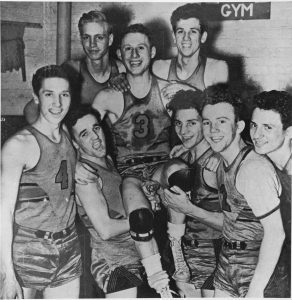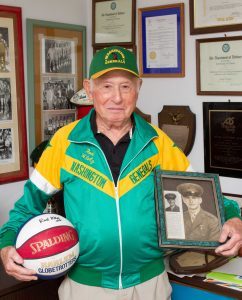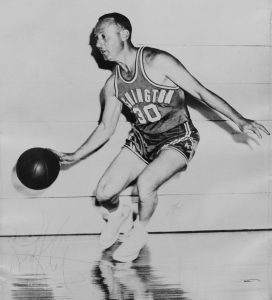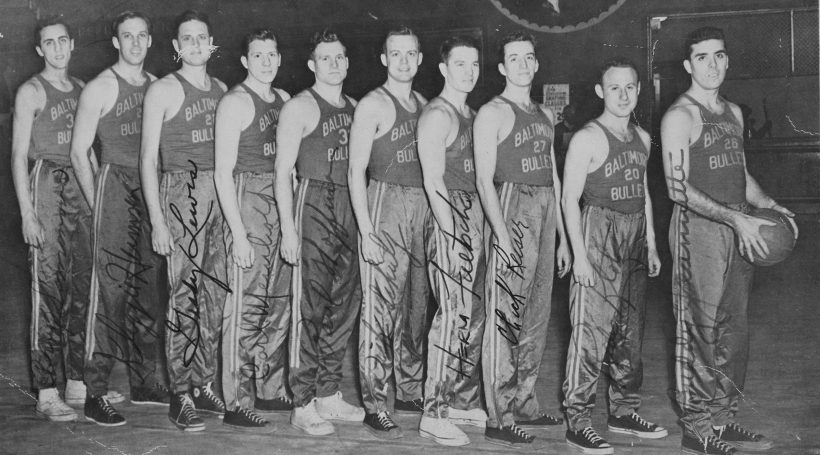Everybody loves to laugh with the Harlem Globetrotters. Their trick plays and funny stunts make for an entertaining family night, plus you can be sure the team you’re rooting for will always win. Not in the spotlight, though, are the Washington Generals, the other team that has been graciously losing to the Globetrotters since 1952.
Led by Margate’s Lou “Red” Klotz, the Washington Generals defend their lopsided record, pointing out the skill (and fun) it takes to play the famous team. As he approaches his 90th birthday, Klotz continues as one of the leaders of the Generals. He reminisced about his exciting life with the team.
 What’s your team’s overall record? Is it hard to lose all the time?
What’s your team’s overall record? Is it hard to lose all the time?
We’ve been out on tour over 50 years, so I would guess that’s about 40,000 games. We’ve only won a few of them. It’s only hard to lose if you’re trying to win. In this case, we’re playing the world famous Harlem Globetrotters. We’re not only an athletic, competitive team, but we’re also an entertainment group. That’s why we’re so different.
When you did win, what happened, and how did the crowd react?
The crowd was very happy for us. Although we’re the most losing-est team in the world, we’re one of the most popular teams in the world. There are fans who realize the losers are a very talented team, only they have to overcome too much to become a winner.
You were a basketball player when you were younger, and you hold the distinction of being the third-shortest person to play in an NBA game at 5′ 7″. Tell us about your career before the Generals.
I played for an NBA championship team in 1947 with the Baltimore Bullets. I played with a championship team in Philadelphia named the Sphas, and I played with a championship team when I was in college at Villanova. I’ve played and coached many other teams. I’ve probably run more miles on a basketball court than any basketball player in the world.
Can you take us back to the beginning. How did you get involved with the Generals?
When I was playing with the Philadelphia Sphas we had an exhibition game against the Harlem Globetrotters. We beat them! That’s when my reputation started to come into play. The owner, Abe Saperstein, asked me to form my own team to travel around the world and play against his team. That was the nicest offer I ever had from one of the nicest people — he became a very close personal friend of mine. Unfortunately, he’s not with us anymore.
 You’ve played in more than 100 countries. What are some of your more memorable experiences?
You’ve played in more than 100 countries. What are some of your more memorable experiences?
We introduced basketball to many, many countries. We used to carry our own basketballs and our own lead pipes for the boards. We played outdoors mainly because there weren’t many indoor courts in the early years. We played on baseball fields, soccer fields, and bull rings in Spain. We played for royalty, including the [the Shah] of Iran, dictators like Juan and Eva Peron in Argentina, and we met the Pope. We now play for the military around the world, going into danger zones to entertain our troops. We played aboard an aircraft carrier, and I played on the USS Enterprise. We had to play a certain way because wherever the planes were sitting there were metal brackets to hold them down and we had to dribble around them. We played in South America in a great big arena that had a tin roof. They had one of those rains tapping on the roof and some water was coming onto the floor. We had to put buckets and towels down where the leaks were coming in. We dribbled around them and played the game in front of 14,000 people. We could handle any situation.
What are some of your favorite Globetrotters’ tricks?
Over the many years I was out there playing against them, I got involved with a lot of their tricks. I’d steal the ball occasionally from them. I was involved in a lot of their gimmicks because I’m only 5’7” so they had a lot of fun with me. But they couldn’t catch me – I was too fast. Also, I could probably out-shoot all of them.
You played your last game with the Generals when you were 68 years old but you still play basketball. Why is basketball your passion?
I play at the Margate Jewish Community Center and I also play outside in the summertime at the very beautiful courts that we have here in Margate City. We have players ranging from 35 to 60, so I’m twice their age. Basketball’s been my passion since I was 12 years old. I always wanted to travel around the world since I was a youngster, and I never dreamed I would be around the world many, many, many times, and I’d see the world and its beauty beside all the horrible things that have happened.
You have 6 children, 20 grandchildren, and 5 great-grandchildren. Do you foresee any of them following in your footsteps?
Family is everything to me, that’s why I was on the road. You do what you have to do to make a living, and basketball has been the strongest thing for me. My wife, who has travelled with me around the world, is a baseball fan – she likes the Phillies. One of my grandsons was a player-coach for three years, and I have a son who was an announcer for the Harlem Globetrotters, so we’re pretty well involved.
 What advice do you have for kids who want to play basketball all their lives?
What advice do you have for kids who want to play basketball all their lives?
The first thing they’ve got to do is make sure they get a degree in something so they can make a living for the family they’re going to have. That’s more important than the sport you love and in the end, that’s what you’re going to need in the future. If you love the game, you’ve got to learn the fundamentals of how to play the game properly. You’ve got to practice and make sure you can shoot 80 percent foul shooting and be a team player.
You’ve been called an ambassador who helped introduce basketball to millions of people across the world. Why is that legacy so important to you?
Because we’re doing something that is good and solid. It isn’t political, although we do represent our country and we make people like Americans. The players today who are coming to the United States are mostly foreigners who are superstars. We were the ones who helped introduce the game to them. We are historically one of the originators of basketball around the world.











